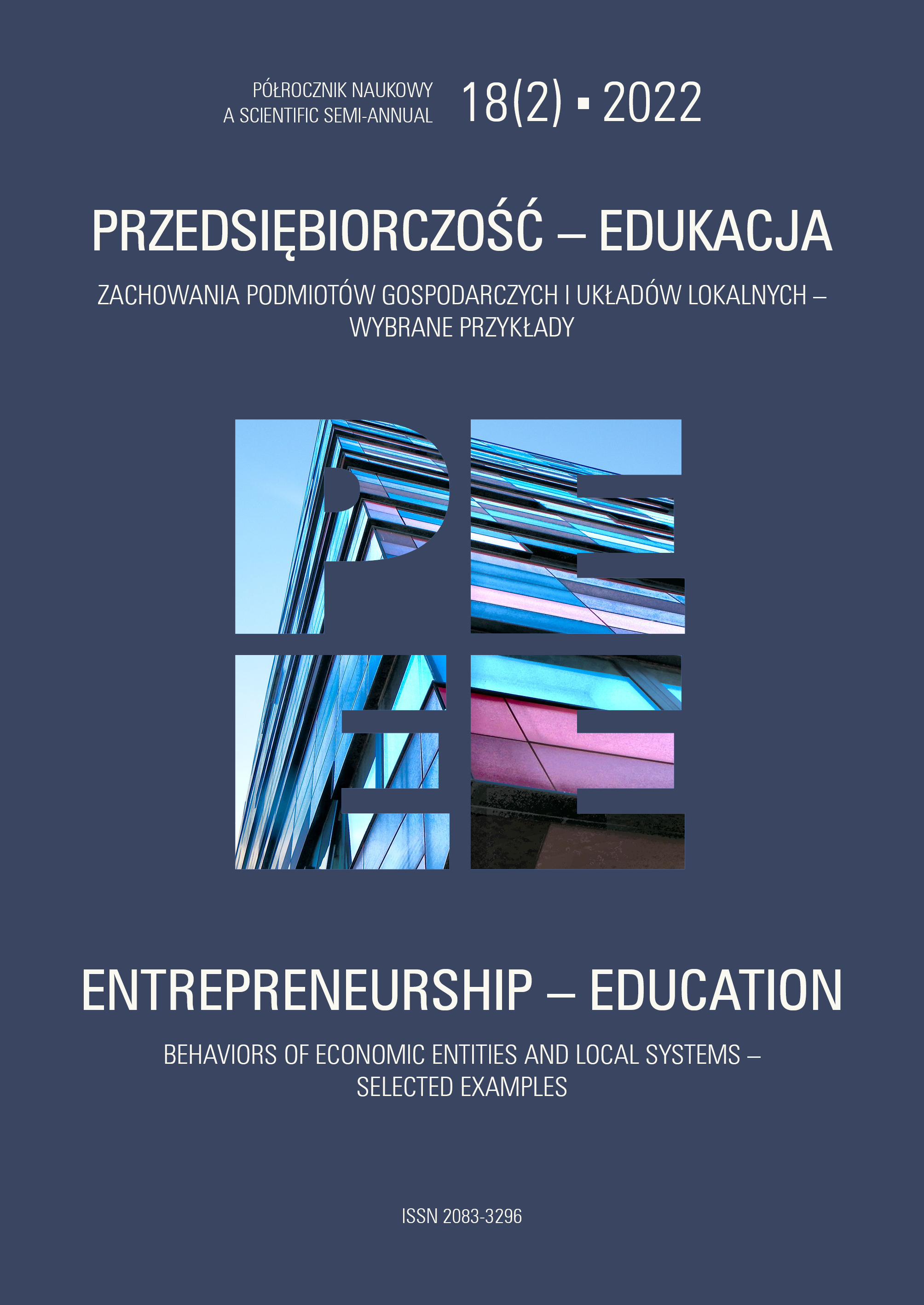The impact of the COVID-19 pandemic on the development of remote work in the small and medium-sized enterprise sector
DOI:
https://doi.org/10.24917/20833296.182.10Keywords:
covid, COVID-19, remote work, SMEs, teleworkAbstract
The article attempts to answer the question of how the remote work model functioned in enterprises from the SME sector during the COVID-19 coronavirus pandemic. In an anonymous survey, the respondents (owners/managers of an SME company) answered questions about remote work before the pandemic, the scope of tasks performed remotely during a pandemic, the difficulties and limitations of this work model and the degree of satisfaction with performing professional tasks outside the place of employment. The respondents were also asked if they would like to continue working remotely after the end of the pandemic. During the pandemic, SME entrepreneurs used the remote working model, but this form of work did not pose any particular difficulties to them, and when it comes to tasks related to the preparation of documents, it turned out to be more effective than the stationary model. Remote work had as many supporters as opponents. What was the greatest limitation for some - combining home and work duties - became an advantage for others. Women found this task easier than men, as evidenced by the fact that more women than men would like to work remotely after the pandemic ends. The pandemic has increased the popularity of videoconferencing, which has become almost as common as the use of e-mail or phone calls for business matters.
References
Binder, P. (2022). Praca zdalna w czasie pandemii i jej implikacje dla rodzin z dziećmi – badanie jakościowe. Przegląd Socjologii Jakościowej, 18(1), 82–110.
Boryczko, M., Dunajska, A. (2021). Zdalna praca socjalna podczas pandemii. Doświadczenia z Polski. Praca Socjalna, 1(36), 45–69.
Delfino, G.F., van der Kolk, B. (2021). Remote working, management control changes and employee responses during the COVID-19 crisis, Accounting, Auditing & Accountability Journal, 6(34), 1376–1387.
Dolot, A. (2020). Wpływ pandemii COVID-19 na pracę zdalną – perspektywa pracownika. E-mentor, 1(83). Pozyskano z: https://www.e-mentor.edu.pl/artykul/index/numer/83/id/1456
Fiedler, A., Benjamin, F., Sinkovics, N., Sinkovics, R. (2021) Exporting from a Remote, Open Economy During COVID-19: Challenges and Opportunities for SMEs. W: K. Husted, R.R. Sinkovics (eds.), Management perspectives on the covid-19 crisis: Lessons from New Zealand. Cheltenham: Edward Elgar Publishing, 71–82. https://doi.org/10.4337/9781800882096.00014
Islam, A. (2021). Remote working challenges and solutions: insights from SMEs in Bangladesh during the COVID-19 pandemic. International Journal of Quality and Innovation, 5(2), 119–140.
Kowalski, D. (2016). Definicja MŚP w przepisach UE a specyfika przedsiębiorstw polskich – wdrażanie środków wspierających rozwój MŚP. Kontrola Państwowa, 61, 2(367), 120–135.
Krysiński, D. (red.) (2020; 2022, 12 września). Raport z badania: Możliwości zastosowania pracy zdalnej w przedsiębiorstwach i instytucjach publicznych. Instytut Badawczy IPC sp. z o.o. / Openfield sp. z o.o. / EDBAD. Pozyskano z: https://wro-ngo.pl/mozliwosci-zastosowania-pracy-zdalnej-w-przedsiebiorstwach-i-instytucjach-publicznych/
Naumowicz, K. (2020). Podstawy prawne kontrolowania pracowników świadczących pracę zdalnie. Praca i Zabezpieczenie Społeczne, 5, 28–35.
Nowak, J., Wieteska, M. (red.). (2020). Nowoczesne technologie w przedsiębiorstwach przed, w trakcie i po pandemii COVID-19. Polski Instytut Ekonomiczny. Warszawa, 53–54. Pozyskano z: https://pie.net.pl/wp-content/uploads/2020/06/PIE-Raport_Nowoczesne_technologie.pdf
Pabian, A.M., Ochwat, M., Kwiatkowska, C. (2021). Rekrutacja i selekcja pracowników w dobie pandemii. Na zlecenie Stowarzyszenia Biznes – Nauka – Samorząd „Pro Silesia” oraz EUROPE DIRECT Śląskie. Pozyskano z: https://us.edu.pl/wp-content/uploads/pliki/Raport-Rekrutacja-i-selekcja-pracownik%C3%B3w-w-dobie-pandemii.pdf
PwC Advisory sp. z o.o. (2020). Polski mikro, mały i średni biznes w obliczu pandemii COVID-19. Przychody, płynność i reakcja na wstrząs. Badanie we współpracy z SpotDara oraz CBM Indicator. Pozyskano z: https://www.pwc.pl/pl/pdf/polski-mikro-maly-sredni-biznes-w-obliczu-pandemii.pdf
Radziukiewicz, M. (2021). Praca zdalna w Polsce i jej perspektywy. Studia Ekonomiczne i Regionalne, 14(4), 409–427.
Sliż, P. (2020). Praca zdalna podczas epidemii COVID-19 w Polsce – wyniki badania empirycznego. E-mentor, 3(85).
Staniszewski, R. (2021). Przedsiębiorczy „cwaniacy”? – przedsiębiorczość w Polsce i społeczna percepcja przedsiębiorców w trakcie pandemii COVID-19 oraz okresie bezpośrednio ją poprzedzającym. Studia Politologiczne, 62, https://doi.org./10.33896/SPolit.2021.62.10.
Stankiewicz-Mróz, A. (2020). Percepcja elastyczności pracy studentów jako reprezentantów pokolenia Z oraz pracodawców z sektora MŚP. Zarządzanie Zasobami Ludzkimi, 132(1), 49–63.
Szarucki, M., Noga, G., Kosch, O. (2021). Wpływ pandemii COVID-19 na modele biznesu przedsiębiorstw sektora MŚP w Polsce. Horyzonty Polityki, 12, 40.
Wasilczuk, J.E. (2014). Przedsiębiorcy 55+, czy wiek ma znaczenie?. Zeszyty Naukowe Uniwersytetu Szczecińskiego. Ekonomiczne Problemy Usług, 111, 196–206.
Wróbel, P., Jendza, D. (2018). Kontrowersje wokół definicji telepracy. Zarządzanie i Finanse, 1(16), 201–214.
Downloads
Published
How to Cite
Issue
Section
License
Copyright (c) 2022 Entrepreneurship – Education

This work is licensed under a Creative Commons Attribution-NoDerivatives 4.0 International License.
Articles are published under the terms of the Creative Commons License (CC BY-ND 4.0; Attribution– NoDerivs).

